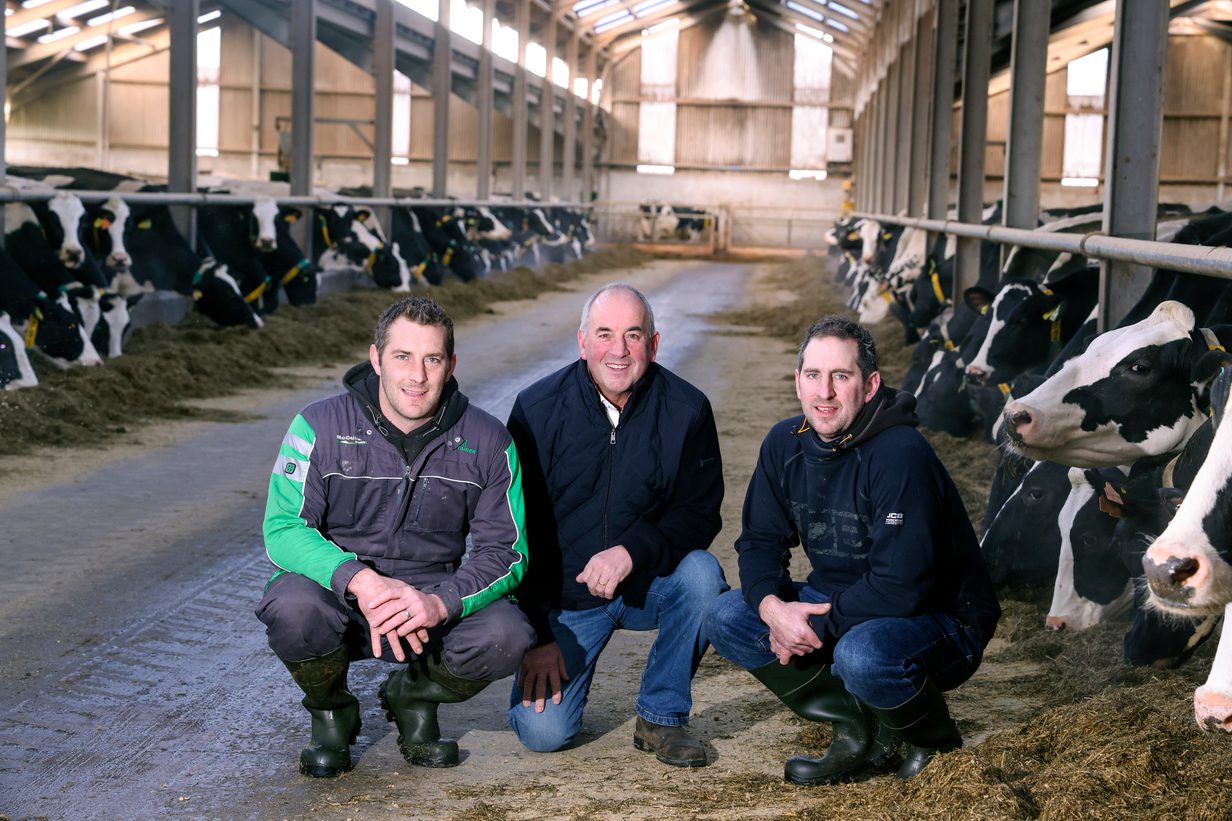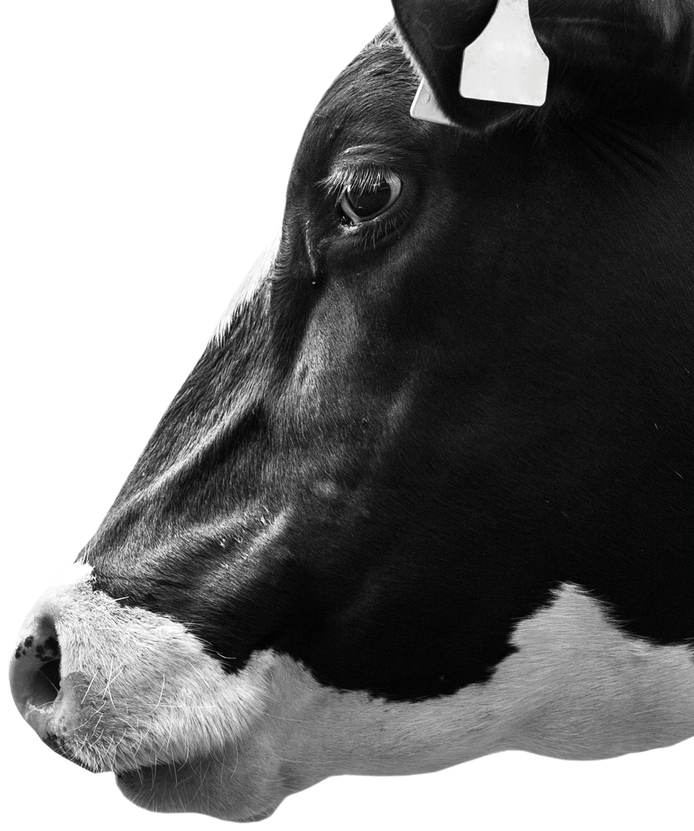NMR RABDF Gold Cup 2023 Finalists Preview - #3 Graham Farms

Graham Farms, Drumgoon Manor, Maguiresbridge, Co.Fermanagh
Attention to detail in all aspects of their dairy business has seen the Graham family from Northern Ireland shortlisted for the prestigious 2023 Gold Cup Award.
The family operation run by father William and sons Jason and Stuart sees them milking 600 pedigree Holstein cows all year round with milk sold to Glanbia.
Production is outstanding from this all-year-round housed herd, with the farm consistently on the top of the Farmgate Consultancy league table of 85 farms, representing 6.5% of total NI milk production.
Cows are averaging 11,400 litres per cow on a twice-a-day milking at 4.1%f and 3.29% protein. The herd has a pregnancy rate of 41.4%, all from sexed semen /beef, with a calving index of 369 days.
Undoubtedly, the family’s skills, experience, enthusiasm, and hard work have been a significant part of the success of the business now and in the future.
William has been farming since 1979 after attending Greenmount Agriculture College, and his wife Gail is a former Nat West Bank Senior Manager, giving the business a great financial steer.
Son Jason is a qualified vet responsible for all veterinary, herd health, breeding and fertility and is credited for the exceptional calving index, breeding policy and low herd mortality.
His brother, Stuart, is an engineer and returned to the farm in 2012, bringing these skills with him. He has designed and self-built new housing of an unparalleled standard to promote cow and calf comfort. He also looks after staff and HR issues and supply acquisition and is described by his father as being a real ‘people person with admirable business acumen’.
In total, they employ five full-time staff along with part-time milkers and occasional seasonal staff as required. Staff turnover is low due to the excellent working environment.
William says their success lies in their attention to detail. “Right from the straw of semen to colostrum in the calves, we ensure everything is done right.
“There are no silver bullets, but all our bullets need to be silver,” he adds.
Having son Jason working on the farm means herd health is unrivalled. Mastitis cases average 7, and lameness is down to 5 cases per 100 cows. As a result, antibiotic levels are low at 21.8 mg/PCU.
In calf heifers are teat sealed three months before calving, and in cases of mastitis, they have a clear protocol to follow.
1. Mild cases are treated with anti-inflammatory drugs and uddermint only
2. Severe cases get anti-inflammatory drugs, oral fluids and, if required, antibiotics.
As a vet, Jason undertakes culture and sensitivity tests on recurrent cases and will treat them as required from a veterinary perspective to achieve the best outcome for the animal.
For lameness control, routine foot bathing is carried out bi-weekly. At all milkings, animals are mobility scored, and any with a score of 2 or above are identified and seen immediately. Weekly visits are also made by a professional hoof trimmer, covering routine trimming (and at 100 days in milk and drying off in addition) and treatment of acute onset lameness.
Four years ago, they also invested in a 60-point GEA rotary parlour containing most of the added extras they could have. “It has all the bells and whistles, which is important from a staff management point of view, efficiency and cow health,” he says.
The family is renowned for their top-quality breeding stock, with a large number of heifers and in milk cows (~250) sold off the farm each year. They aim to breed heifers with:
- Functional type
- Medium stature
- Using Sire PLI minimum £600
- Positive for protein and butterfat, with a target 900kg milk solid (fat and protein).
- Good mammary, locomotion, deep, wide chest through to the rump
- Longevity
The sale of breeding animals forms a large part of their business’s success, with the income outweighing the total cost of rearing the heifer replacements.
Animals are fed to yield in the parlour, with a push to increase the amount of milk from forage by adopting a multi-cut silage system. This year, they also started introducing clover into the grass swards for extra protein and their ability to fix nitrogen into the soil.
They are also targeting their slurry use by using low-emission slurry spreading equipment to effectively use slurry and reduce the use of purchased fertiliser. The use of slurry additives is also helping them to increase the available nitrogen and reduce the need for bagged fertiliser.
They have signed up with DAERA Soil Nutrient Health System, and the entire farm is being soil sampled to determine a starting point for carbon sequestration.
The drive in the short term is to continue maintaining farm output whilst addressing environmental issues. Their carbon footprint is currently 1.3976 kg per kg of FPCM. They are also actively improving biodiversity on the farm by leaving a proportion of hedgerows untrimmed and fencing off lakeside woodland to encourage certain habitats.
Williams adds: “Good can always become better, and the farm will continue to maintain farm output whilst addressing environmental issues. We are also striving to grow more grass per hectare from less purchased N in the future. This will mean careful attention to the soil samples.”
The farm has recently finished constructing a large store for straights to drive down feed costs and their carbon footprint by buying full loads.
They are also researching clean green energy on the farm and are considering solar panels for the dairy unit.
William adds: “We want to ensure we have a financially strong business to allow for succession.”
Pointers
• Excellent attention to detail
• Push to produce more from grass
• Strong reputation for breeding stock
• Want to do everything right for the cows with no expense spared.
Farm Facts Graham Farm
• Milking 600 pedigree Holstein cow
• Average yield: 11,400 litres per cow on a twice a day milking at 4.1%f at and 3.29% protein
• All year-round calving
• 6% mortality from birth to calving down heifers
• Herd health: Mastitis rate 22.6%, Somatic cell count (SCC) 76
• 351ha
• Supplies Glanbia
